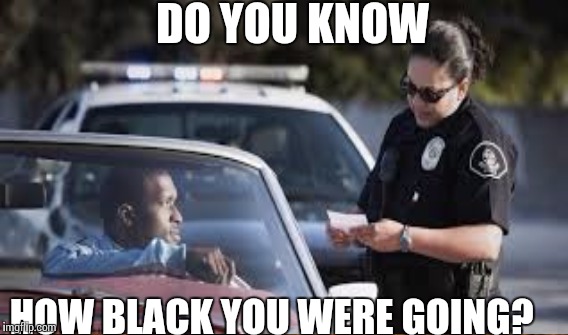Driving while Black is a huge problem in the US but it is not the only problem that faces motorists of all colors. Cops aka road pirates are setting up road block under the guise of looking for unlicensed drivers but in fact they are looking for drugs, weapons and other contraband. Cops need probably cause to stop or detain a motor and its passengers. It's a violation of the 4th amendment because this sort of detainment is illegal an in constitutes an illegal seizure. It is also a violation of the 14th amendment.
Beyond all of the above, it is a waste or law enforcement resources because the job of the police is to catch bad guys. In addition to that, there not reason to subject the public to this harassment because it makes them resent the police. It also puts police in danger of being struck by a car. If you protest it may ruffle the cop's feathers to the point they make extract you from your car or come up with a reason to beat, taser or shoot you. If you are Black, the odds of a rogue cop killing you increase dramatically.
Record any such encounter and file a lawsuit. If in your judgment the cops are not punks or bullies, politely explain to them that what they are doing is unlawful. If you are Black be very careful because the fact is, cops are a greater danger to African Americans than they are to White Americans.
U.S. Supreme Court
Delaware v. Prouse, 440 U.S. 648 (1979)
Delaware v. Prouse
No. 77-1571
Argued January 17, 1979
Decided March 27, 1979
440 U.S. 648
Syllabus
A patrolman in a police cruiser stopped an automobile occupied by respondent and seized marihuana in plain view on the car floor. Respondent was subsequently indicted for illegal possession of a controlled substance. At a hearing on respondent's motion to suppress the marihuana, the patrolman testified that, prior to stopping the vehicle, he had observed neither traffic or equipment violations nor any suspicious activity, and that he made the stop only in order to check the driver's license and the car's registration. The patrolman was not acting pursuant to any standards, guidelines, or procedures pertaining to document spot checks, promulgated by either his department or the State Attorney General. The trial court granted the motion to suppress, finding the stop and detention to have been wholly capricious, and therefore violative of the Fourth Amendment. The Delaware Supreme Court affirmed.
Held:
1. This Court has jurisdiction in this case even though the Delaware Supreme Court held that the stop at issue not only violated the Federal Constitution but also was impermissible under the Delaware Constitution. That court's opinion shows that, even if the State Constitution would have provided an adequate basis for the judgment below, the court did not intend to rest its decision independently on the State Constitution, its holding instead depending upon its view of the reach of the Fourth and Fourteenth Amendments. Pp. 440 U. S. 651-653.
2. Except where there is at least articulable and reasonable suspicion that a motorist is unlicensed or that an automobile is not registered, or that either the vehicle or an occupant is otherwise subject to seizure for violation of law, stopping an automobile and detaining the driver in order to check his driver's license and the registration of the automobile are unreasonable under the Fourth Amendment. Pp. 440 U. S. 653-663.
(a) Stopping an automobile and detaining its occupants constitute a "seizure" within the meaning of the Fourth and Fourteenth Amendments, even though the purpose of the stop is limited and the resulting detention quite brief. The permissibility of a particular law enforcement practice is judged by balancing its intrusion on the individual's Fourth Amendment interests against its promotion of legitimate governmental interests. Pp. 440 U. S. 653-655.
(b) The State's interest in discretionary spot checks as a means of ensuring the safety of its roadways does not outweigh the resulting intrusion on the privacy and security of the persons detained. Given the physical and psychological intrusion visited upon the occupants of a vehicle by a random stop to check documents, cf. United States v. Brignoni-Ponce, 422 U. 3. 873; United States v. Martinez-Fuerte, 428 U. S. 543, the marginal contribution to roadway safety possibly resulting from a system of spot checks cannot justify subjecting every occupant of every vehicle on the roads to a seizure at the unbridled discretion of law enforcement officials. Pp. 440 U. S. 655-661.
(c) An individual operating or traveling in an automobile does not lose all reasonable expectation of privacy simply because the automobile and its use are subject to government regulation. People are not shorn of all Fourth Amendment protection when they step from their homes onto the public sidewalk; nor are they shorn of those interests when they step from the sidewalks into their automobiles. Pp. 440 U. S. 662-663.
(d) The holding in this case does not preclude Delaware or other States from developing methods for spot checks that involve less intrusion or that do not involve the unconstrained exercise of discretion. Questioning of all oncoming traffic at roadblock-type stops is one possible alternative. P. 440 U. S. 663.
382 A.2d 1359, affirmed.
WHITE, J., delivered the opinion of the Court, in which BURGER, C.J., and BRENNAN, STEWART, MARSHALL, BLACKMUN, POWELL, and STEVENS, JJ., joined. BLACKMUN, J., filed a concurring opinion, in which POWELL, J., joined, post, p. 440 U. S. 663. REHNQUIST, J., filed a dissenting opinion, post, p. 440 U. S. 664.
